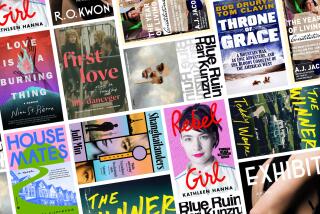BOOK REVIEW : A Book Fay Powell Would Have Loved : EUCALYPTUS FAIR: A Memoir in the Form of a Novel, <i> by Lawrence Clark Powell</i> , Books West Southwest, $20, 271 pages
If the name Lawrence Clark Powell evokes only the stately Italianate-Gothic library on the Quad at UCLA, then “Eucalyptus Fair” will come as something of a revelation.
Powell, like the library that bears his name, is something of a landmark. Over a long and accomplished career, he has distinguished himself not only as a librarian but also as a historian, a biographer and a patron of the literary arts. Now, at age 86, he gives us a coming-of-age novel half a century or so after it was written “in pencil on a yellow pad and on the margins of a dollar-an-hour job in a war plant.”
“Eucalyptus Fair” is the autobiographical tale of Powell’s college years in Southern California during the 1920s. “I wrote four drafts, increasingly bad,” Powell once remarked, but now he has taken the raw prose of his youth and turned it into a bittersweet memoir and a kind of homage to Fay Powell, the woman with whom he shared his life and work.
Indeed, the story of how the novel was written and why it was so long in seeing print is impossibly romantic in itself--Powell’s wife, embarrassed by the intimacy (and transparency) of the manuscript, extracted a promise that he would not publish it during her lifetime.
“Ours was the fateful attraction of opposites,” he writes in “Eucalyptus Fair,” “she private, I public, in a polarity that held our marriage together for more than 50 years, to end only with her death, four months short of her 80th birthday.”
Now bereft of his soul mate, but released from his promise, Powell has allowed the book to be published. But Fay Powell need not have fretted: “Eucalyptus Fair” is frank and forthcoming, to be sure, but it is essentially a sentimental and even reverential depiction of a young man’s passion for poetry, music and the love of a woman.
Set in Los Angeles during the high-spirited years before war and Depression, on a campus that resembles Occidental College, “Eucalyptus Fair” evokes a distant time and place when the world and everything in it were on the verge of breaking down or blowing up. Powell invites us to follow a young man dubbed Bill Bridge and his college chums through romance, crisis and adventure: a fling with a pair of flappers, an accidental pregnancy that ends in a back-room abortion, a premature death that cuts short a budding romance, a drunken road accident that is a form of mourning for the death of Bill’s ailing mother.
Bridge is depicted as a gifted musician and an aspiring poet who pays his way through college by playing piano at dance halls and on cruise ships. But it is above all Bill’s tormented love for a young woman named Joy Carpenter that moves the young man to summon up all of his bookish passion in service of courtship. A smuggled copy of “Lady Chatterley’s Lover” becomes a tool of seduction in the hands of this ardent young man of letters.
“How I wish we could read Lawrence’s book together,” he writes to Joy. “Kisses to you, darling, and not on the cheek.”
The current that crackles through the pages of “Eucalyptus Fair” is the tension between love and art. Bill’s doctor and mentor, a highly literate physician named Fruhling, encourages the restless young man to abandon the conventions of the academic life and seek his own muse in Europe, even at the risk of losing Joy.
“Suffering” is his prescription for the artist. “Out of it comes the greatest works of art, not out of fulfillment,” Fruhling lectures. “It’s the struggle for fulfillment, or the tragedy of losing it, that draws tight an artist’s strings.”
“Eucalyptus Fair” is a period piece, of course, and the courtship rituals and even the prose are slightly antique. The college president is invariably called “the Prexy.” “I knew I had pulled a boner,” admits Bill Bridge in an uncomfortable encounter with the stern father of a co-ed. And I wondered how many contemporary readers will understand what Powell is talking about when, in describing the first dance at the El Rodeo ballroom, he observes that “the first few couples shot like peas from a pipe.”
The final chord of “Eucalyptus Fair”--and the element that turns the novel into a memoir--is a new chapter titled “Primavera,” in which Powell brings Bill and Joy back together and points the reader in the direction that his own life actually took, a lifetime of dedication to literature and the love of an exceptional woman.
Bill has lingered in Europe, where--among many other adventures--he is offered a job playing piano in a Dijon brothel “for meals and perks,” but the price is exactly what Fruhling predicted: Bill and Joy are separated, and he suffers over the loss of her love. When Bill returns to California at last, he finds Joy married and the mother of a newborn baby. Their reunion is a moment of high drama and deep poignancy, and--as Bill struggles to win back Joy--Powell shows us some of the ways in which life truly resembles art.
“Eucalyptus Fair” closes with a fragment of Browning: “. . . give her eyes the first embrace of my face, ere we rush, ere we extinguish sight and speech, each on each. . . . “ Knowing what we know about the youthful Larry Powell and the woman he loved, these last few lines bring an ache, a shiver and a tear. And Fay, I’d like to think, would not have been displeased.
More to Read
Sign up for our Book Club newsletter
Get the latest news, events and more from the Los Angeles Times Book Club, and help us get L.A. reading and talking.
You may occasionally receive promotional content from the Los Angeles Times.









